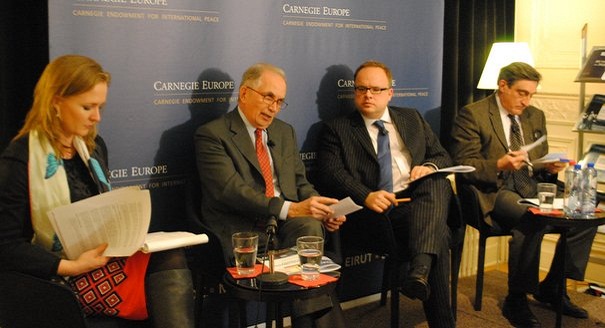Registration
You will receive an email confirming your registration.
IMGXYZ4124IMGZYXAccording to several independent reports, press freedom in Turkey has deteriorated steadily. The judicial prosecution and imprisonment of journalists hit record highs in recent years, damaging the country’s image. Will Turkey change its policy toward the media? What must happen to improve the country’s press freedom record, and how will this ultimately benefit Turkey and its international standing? How can a positive trend toward better press freedom be engineered?
Carnegie Europe, in cooperation with Open Society Foundation (Turkey), hosted an event to mark the launch of Press Freedom in Turkey, a new paper by Carnegie’s Marc Pierini. Together with Marietje Schaake, member of the European Parliament, and Ahmet İnsel, managing editor of İletişim Publishing House and columnist at Radikal newspaper, Pierini discussed his proposals to improve press freedom in Turkey. Carnegie’s Jan Techau moderated.
Highlights
- Areas of Concern: Pierini outlined a number of areas of concern for press freedom in Turkey, including the Kurdish issue, Turkey’s flawed legal framework, and an overzealous judiciary. Furthermore, direct government interference in the journalistic process and overregulation and censorship of online activities pose severe restrictions to the independent workings of digital and print media sectors. Pierini also warned that a conglomerated media market could undermine critical reporting in favor of protecting business interests.
- Rationales for Improving the Record: The government made a commitment to its citizens and partners to achieve what it calls an “advanced democracy,” Pierini said; but without a truly free press, he added, Turkey is far from realizing this vision. Economically, Pierini argued that improving Turkey’s press freedom record could improve the country’s attractiveness for foreign investment, and ultimately its international standing as part of the group of first class democracies. Turkey’s ongoing institutional transformation and societal modernization necessitate a free press, Pierini added, and these same factors undermine both the rationale behind and the means of obtaining the suppression of information.
- Ways Forward: Pierini argued that the passing of a bold fourth judicial reform package that is currently under final consideration is crucial for addressing serious impediments to a free press. In addition, he suggested that a revived EU accession process, a resolution of disputes over imprisoned journalists, and an increased interaction between Turkish and EU civil society organizations could help advance press freedom.
- Contextualizing the Issue: Schaake emphasized the need to contextualize the necessary reforms in Turkey within a broader framework of rule of law, pluralism, and judicial independence. This entails debunking the notion that the problem is one of terrorism, not press freedom, Schaake added. The EU can play a role in this, with confident and constructive engagement.
- A Broader Pattern: İnsel stressed that the nearly 10,000 arrests connected to terrorism laws in Turkey demonstrate the government’s attempt to weaken the Kurdish movement by targeting empathetic journalists and lawyers. Additionally, İnsel argued that such an authoritarian tendency in an otherwise democratic setting warrants labeling Ankara an “authoritarian democracy.”
- Overcoming Self-Censorship with Political Leadership: Panelists agreed that the key challenge facing Turkey’s pluralist democracy is the self-censorship that emerges from curtailments of press freedom and the current political atmosphere. The acceptance—and even embrace—of dissent by the leading political figures in Turkey will be crucial in bringing the now-marginalized critical discussion back into mainstream societal discourse, they said.
